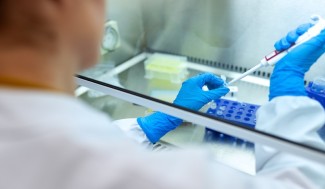A major neurological emergency, status epilepticus is defined as a persistent epileptic seizure. Exposing patients to irreversible brain lesions that cause serious cognitive sequelae, it requires intensive care, which may lead to sedation (artificial coma). Researchers and clinicians at the Paris Brain Institute (Inserm/CNRS/Sorbonne University) and at the Pitié-Salpêtrière Hospital (AP-HP) have just identified new clinico-biological markers, allowing to evaluate the recovery capacities of a patient after a status epilepticus, their degree of loss of autonomy and in some cases, the mortality. These results, published in the Journal of Neurology, mark a first step towards the development of a reliable prognostic tool that can be used routinely in hospitals.
Contrary to "classic" epileptic seizures, which last only a few seconds, status epilepticus corresponds to a continuous discharge of neurotransmitters by the neurons of the epileptic focus, located in the cerebral cortex, for several minutes, hours, or even days. These seizures expose the patients' brain to irreversible damage. This pathology affects nearly 20,000 children and adults in France every year. In nearly 25% of cases, status epilepticus is refractory to medical treatment and requires intensive care. Assessing the patient's future condition upon discharge from the ICU is essential to guide the medical team and family members towards subsequent care. Although several clinical and biological markers have been proposed over the last twenty years, no prognostic tool is currently available, as the identification of prognostic markers remains difficult due to the heterogeneity of clinical presentations and etiologies.
At the Paris Brain Institute, researchers from the "Dynamics of epileptic networks and neuronal excitability" team, led by Prof. Vincent Navarro (AP-HP Sorbonne University) and Dr. Mario Chavez (CNRS), are proposing, in a study conducted in collaboration with the neurological intensive care and biochemistry departments of the Pitié-Salpêtrière Hospital, new clinico-biological scores to optimize the prognostic evaluation of patients admitted to the intensive care unit with status epilepticus.
The study conducted by Dr. Aurélie Hanin was carried out on a cohort of 81 patients hospitalized in the intensive care unit of the Pitié-Salpêtrière Hospital AP-HP. Their status was assessed before the seizure, at discharge from the ICU and between 6 and 12 months after discharge.
A first statistical model of artificial intelligence, developed by the scientists, highlighted a dozen clinical and biological variables measured at the entry of the patient in the intensive care unit, whose association makes it possible to identify 74% of the patients with a loss of autonomy at the exit of the intensive care unit, and 73% of the patients in whom the status epilepticus did not have consequences. A second statistical model, associating only three clinico-biological variables (phospholipids, cholesterol, and refractory character of the status epilepticus) was able to identify 80% of the patients with a loss of autonomy.
The research team also proposed for the first time a simple clinico-biological score (with cholesterol and creatinine values and the patient's initial state) to predict the degree of loss of autonomy expected at the end of intensive care.
These prognostic scores are not currently intended to directly assist medical decision-making for patients in intensive care. However, they have demonstrated their relevance in defining patient evolution profiles. In the long term, we hope that they will be able to provide hospital teams with a more global view of a patient's condition, which will benefit patient care.
These new clinico-biological tools are the subject of a patent managed by the Assistance Publique des Hôpitaux de Paris. The research team is also collaborating with the IT Department of the Paris Brain Institute to develop a mobile application that will facilitate the deployment and use of these scores in clinical services.
This project is funded by the ICM Foundation, the AP-HP Foundation and the Fondation pour la Recherche Médicale (FDM20170839111).
Sources
Clinico-biological markers for the prognosis of status epilepticus in adults. Hanin A, Demeret S., Lambrecq V., Rohaut B, Marois C, Bouguerra M., Demoule A., Beaudeux J-L., Bittar R., Denis J., Imbert-Bismut F., Lamari F., Rucheton B., Bonnefont-Rousselot D., Chavez M., Navarro V. Journal of Neurology. 29 juin 2022. DOI: 10.1007/s00415-022-11199-4







